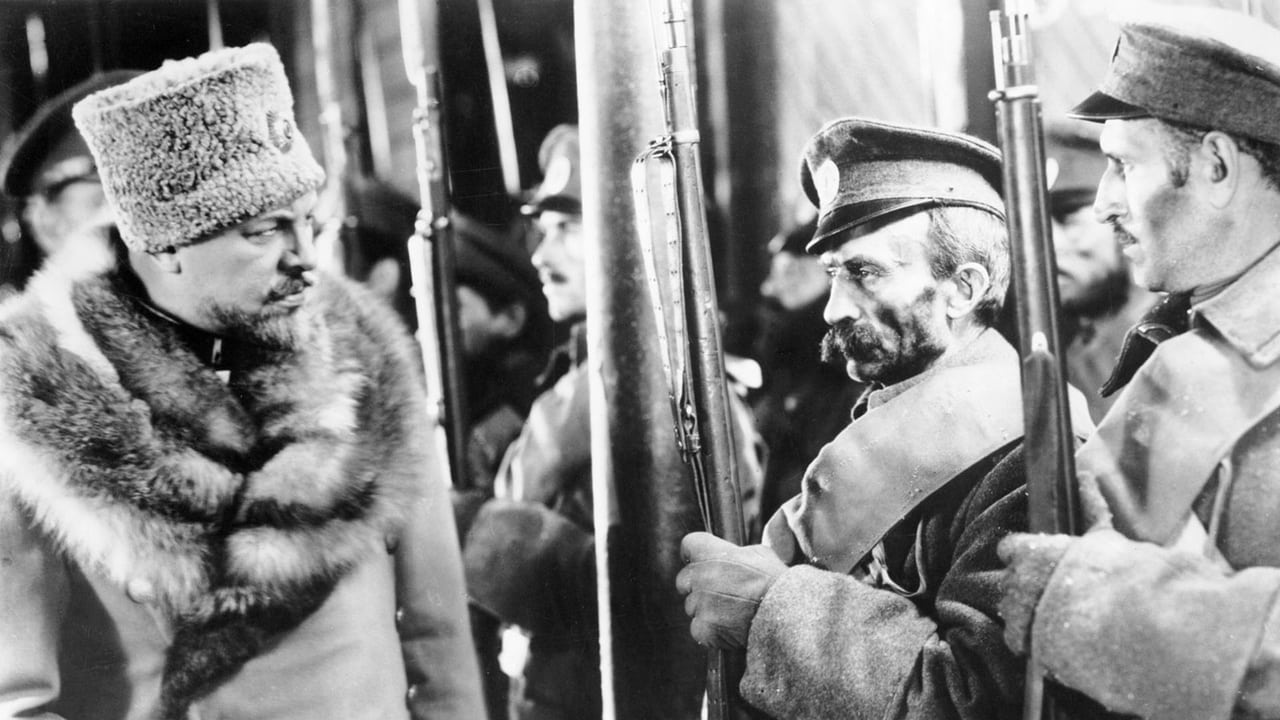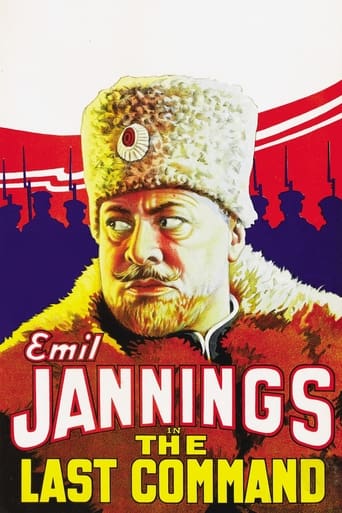

"The Last Command" is a beautiful and extraordinary film in the best tradition of classic story-telling, with German actor Emil Jannings giving an outstanding performance for which he won the first Oscar for "Best Actor" ever. Based on the life of Russian official Theodore Lodijensky, who ran from the Soviet revolution and worked in Hollywood as an extra in silent films, Jannings plays a general who is chosen for a big historical production by a fellow countryman, a theater director who he once persecuted in Russia, for his subversive activities, and who is now in charge of the film's direction. From the first scenes when the military is selected, when he arrives in the studio, dons his costume and makes up, to the scene he impressively plays in the film-within-the-film (containing one of the most eloquent critics to cinema when turned into a cold industry that makes either films as sausages or limousines), "The Last Command" consists of a long flashback of the general's life in Russia, when he incarcerated the theater director and fell in love with a revolutionary actress. Jannings would work again for Sternberg as the protagonist of "The Blue Angel", seduced by the wicked Lola-Lola (Marlene Dietrich). Highly recommended.
... View MoreIt was sad that when the war ended he was black listed from films for good.But he was dying of cancer and didn't have the strength to fight to get to the white list. He ended his days as a successful farmer. It seems thats , even though it takes place in 1917, Evelyn Brent, who was ten years younger than Emil,was wearing a 1928 curly hair bob and a 1928 dress.But that was the only inaccuracies the film have. Everything else seemed accurate for that period, Emil did a excellent performance as the grand Duke, thinking he's doing his duty for Russia and yet does not agree with everything with the czar. A young William Powell, who plays Lev Andreyev, who's fed up with the Czars dictatorships and want to see it fall who is a stage director at the theater.Evelyn Brent, in her roaring twenties look,plays Natalie who is fed up with the Czar dictatorship and hangs around with Lev , until he get's arrested. Well Natalie fall for the duke , once she learns he doesn't agrees with the war .Well The Russain people revolt and take over the train station, that Emil and Evelyn and the troops are going to take. Knowing disaster going to Happen to Emil, she pretends to oppose him. So she could get him to shovel the coal in the train and then give him back his pearls , he gave her. so he can sell it and leave Russia. Well as soon a Emil jumps out of the train he witnesses it ending up in the icy river, as the bridge collapse.Now he is an extra in Hollywood working for Lev , who escaped Russia now works for paramount pictures. Poor Emil ends up dropping dead after his performance in recreation of the revolution he had experience. Why did not Emil took English language lessons when he was in Hollywood. He would not of have to work under Hitler. I don't think Evelyn or Williams were simultaneously shooting Paramounts first talkie. That was probably middle 28.
... View MoreI first watched this in the early 1990s as part of a series of Silents broadcast on late-night Italian TV; of course, it has nothing to do with the 1955 film of the same name – a Western about the battle of The Alamo. In fact, the central premise here – an eminent figure's fall from grace – was basically borrowed from a previous Emil Jannings vehicle, F.W. Murnau's celebrated THE LAST LAUGH (1924), and re-used – once more with Jannings – in THE BLUE ANGEL (in this case, again directed by Sternberg)!; it was not coincidental, therefore, that this viewing followed the one of the latter's much inferior remake. The film's dual setting – the 1917 Russian Revolution and Silent-era Hollywood – ranks it as one of the most devastating portrayals of either: the pageantry and crowd scenes of the former are comparable to the contemporaneous work done by the great Soviet directors while the latter's cynical (i.e. beyond mere satire) viewpoint comes as something of a surprise, as if Sternberg was unapologetically biting the hand that fed him (but then his arrogance has been well-documented over the years)! The film is noted for winning Jannings the first ever Best Actor Oscar (which he actually shared with his performance in the presumably lost THE WAY OF ALL FLESH [1927]): he is extraordinary as both the supercilious aristocratic General (described as being the true power behind the Czar) and the pathetic, broken shadow of his former self scrounging for a living as an extra in a film studio.His come-uppance had occurred when a train he and his troops had been traveling on was captured by the revolutionaries and, brutally beaten up (he would thereafter suffer from a permanent twitch of the head!), he was then forced to shove coal into the train's engine. Circumstances, however, find him jumping off it minutes before the collapse of a bridge and the vehicle plummeting into the river below. Among those on board were two people who had exchanged loyalties towards him: his valet begins to scorn him and appropriate his expensive clothes and cigarettes, while a female member of the revolution (Evelyn Brent, from Sternberg's own UNDERWORLD [1927]) he had virtually made his concubine discovers she has feelings for him and is actually the one to co-ordinate his escape (still, her about-face comes off as both abrupt and unconvincing – especially since she had earlier been touted as the opposition's most dangerous element)!A theater director and former comrade of hers (William Powell), who had been whipped in the face by Jannings but was eventually freed from prison, would become a successful Hollywood director; the film actually begins with him despairing of finding the right face to play the General in a new production about the Russian Revolution until he happens upon a photo of his old nemesis. Of course, Jannings recognizes him too when he turns up on set (an interesting scene has the extra conflict with a member of the wardrobe department over where a certain medal should be pinned on an officer's uniform – only to have Powell fit it according to Jannings' view and the authentic dress code). Predictably, the protagonist's perception of reality becomes blurred when he is thrown back into his true métier, and his fervent 'performance' – goading his men to save Russia and the monarchy from the Revolution – brings on a heart attack and he expires on the spot, ironically in Powell's hands (typically, though he saw it coming, the director kept the action going and the cameras rolling)!Another quibble I have with the film makes it a prime example of Sternberg's pre-occupation with the visual aspect over narrative content: one would have expected Jannings and Powell to mention Brent when they come face to face once more: since the latter had no knowledge of her ultimate change of heart, it would be understandable if he were to seek revenge for the woman's death but would it not have been extra ironic (thus still pack an emotional wallop) had Jannings told him what really happened and Powell subsequently decided to let him go? Curiously enough, then, the Criterion DVD is accompanied by a rather pretentious video essay (courtesy of Tag Gallagher) – discussing all 3 titles in the Sternberg Box Set and others from his early i.e. pre-Dietrich phase – which makes a case for the director's ability to tell a story not through standard plotting but essentially via the movement of characters, their interaction with the scenery and, of course, the way everything is lit!
... View MoreThe Last Command was one of the best movies I've ever seen. Chronicling the rise and fall of a Russian dictator with so much power, emotion, and humanity that it is very easy to forget this is a silent picture. Emil Jannings as General Dolgurucki shows such mad obsession for power over everyone and everything, only to be betrayed by his entire country and left a sad withering shell of the man he once was. The scene where Jannings gives his "last command" was amazing in his portrayal of the sad old man reliving his glory days. The flaring of his eyes, the strength of his stature, the passion of his words are a fitting end to a great man's life. It make sense that the general would die on a movie set since it was the only plausible place left that he could die an honorable death on the battle field. Perhaps The Last Command is a portrait of the first method actor, but that would sell it short because it is about so much more than that. Every character seems to have a few tricks up their respective sleeves, or skirts. One of the running themes is that people are capable of anything, and it shows to a great extent. The general goes through such a physical change from stately dictator to grubby extra that it is hard to believe that each end of the spectrum ever had anything to do with the other.
... View More